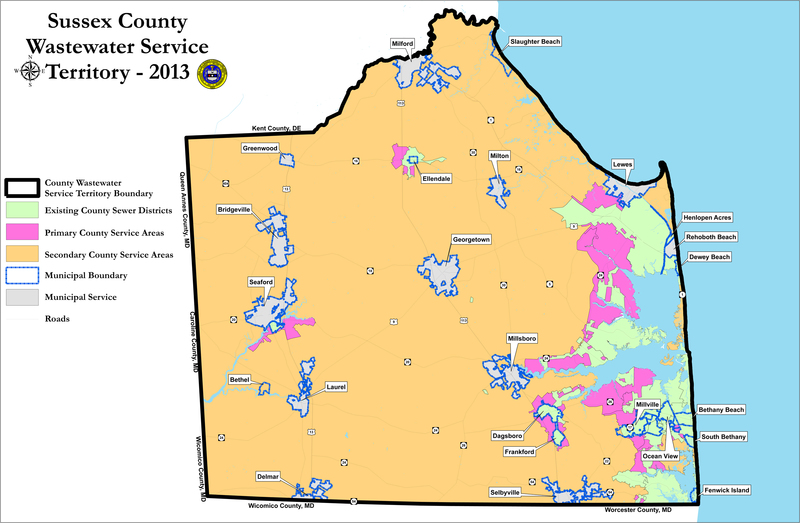New map gives Sussex more say on sewer projects
To better plan and coordinate sewer service, Sussex County Council has adopted a new wastewater service territory map on file with the Delaware Public Service Commission. The new map gives county officials more say in private wastewater company's applications to the Public Service Commission.
The map not only includes current sewer districts, but also the county's western Sussex, north coastal, south coastal and Roxana planning areas. Most of the county – excluding municipal and existing private systems – is included on the map.
County engineer Mike Izzo said county officials will have the right of first refusal for wastewater requests throughout most of Sussex. “It doesn't take away the private companies' right to serve, but it does give us a layer of review for future service,” he said.
“An updated map provides local control by the county for future sewer service,” said County Administrator Todd Lawson, adding without the updated map county officials have had little say in private sewer projects outside the county's primary and secondary service areas.
Now, with the updated map, the county's primary and secondary services have expanded to cover most of the county.
Private companies must get approval from the PSC for sewer projects, while Sussex County and towns are exempt from regulation. The permits granted by the PSC are known as certificates of public convenience and necessity.
Lawson, who helped prepare a report to council, said the new map was needed to better plan for growth. Sussex administration of wastewater systems differs from Kent and New Castle counties; in New Castle, the county is one sewer district, giving county government authority over administration of all wastewater services. In Kent County, officials use the zoning code to restrict wastewater services within the county's defined growth areas.
Lawson said PSC staff has indicated they would endorse the updated map.
Private companies and the county all have a role to play in providing sewer services to county residents, said Jerry Esposito, president of Tidewater Utilities, a private provider of sewer and water systems throughout the county.“We want to work cooperatively with all other utilities to serve the people,” he said. “We welcome the opportunity to work with the county.”
|
|
Better planning needed for future growth
Lawson said the new map has no impact on existing sewer permits and the PSC still retains all authority over future permit approval for private systems.
“The county has had little authority when it comes to the planning and administration of private sewer service within our jurisdiction,” Lawson said. “Adequate planning is necessary so that the expansion of county sewer systems can occur in a responsible and well-organized manner.
Izzo said new developments are being served by private providers' wastewater systems while adjacent, older communities outside county planning areas have no plan for upgraded or central systems. “Then there are individual lots with no opportunity to be served,” he said. “The state does not look from the planning point of view. It looks at the nuts and bolts in a case-by-case basis.”
He said state law provides little or no remedy to the county for the administration of private wastewater services. Scattered sites with little or no planning are the end result, Izzo said.
The expanded map will also assist county officials in meeting Environmental Protection Agency regulations. Izzo said under new EPA regulations, 6,000 existing Chesapeake watershed individual septic systems must be removed and converted to central systems by 2025; the watershed covers nearly half of the county. “Sussex County will be a key player,” Izzo said.
County will have say on private applications
Izzo said sewer permits are scattered throughout the county with most along the Route 5 corridor and the Laurel and Delmar areas. “In some areas, we have CPCNs with Artesian and Tidewater side by side,” he said.
“Current sewer construction has resulted in an inefficient system that makes future growth nearly impossible and extremely cost-prohibitive for some areas,” Lawson said. PSC-issued sewer permits to private companies are approved in perpetuity, with no regard for how many years residents will actually be hooked up to a system.
Lawson said the lack of proper planning for growth has resulted in multiple sewer lines lying side by side and crisscrossing each other in the same area while pumping wastewater in different directions.
Recently, the PSC approved an application from Tidewater Utilities for 17 sites around Milton, including one in Broadkill Beach. Sussex County objected to the application, but it was granted anyway by the PSC because the area was not included on the county's territory map. The county objected because the sites were scattered with no schedule for service.
















































